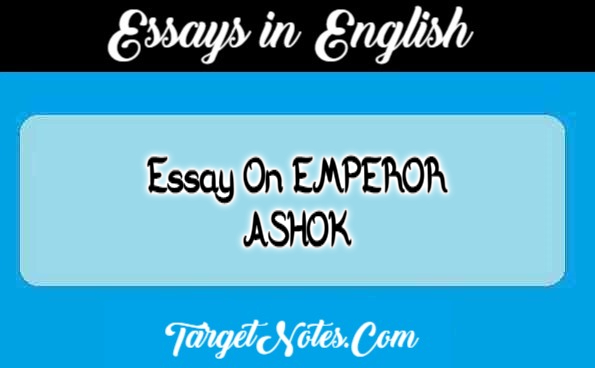
Essay On EMPEROR ASHOK
Introduction
Ashok was one of the two great emperors of India. He sat on the throne of Magadh in 272 B.C. He reigned for about 40 years. He was the first king to educate his men and lead them to the path of truth. He was the only military man who gave up warfare.
Birth, childhood and education
Ashok was the grandson of Chandra Gupta who founded the Maurya Empire. The name of his father was Bindusar. Ashok was brought up in his father’s palace in Patliputra, the capital of Magadh. In the name of education he was taught things that would supply learning, culture and wealth. It is said that as a child he was very furious. But after he had sat on the throne, there was a complete change in his nature.
His conquest over Kalinga
About the year 262 B.C. he decided to make an attack on the kingdom of Kalinga now called Orissa. He fought a bloody war. After a great slaughter of men, women and children, he conquered Kalinga and added it to his empire.
Conversion to Buddhism
But he had not the cruel heart of a conqueror. The sight of terrible ruin filled his mind with horror. The sufferings and bloodshed in the war had a great effect on his mind. At that time, he met a great Buddh preacher named Upagupt. The teachings of Upagupt brought about a complete change in his life and character. He made Buddhism the state religion. He made up his mind to establish an empire on love, order and peace.
Spread of Buddhism
Buddhism made him a lover of all forms of life. He built hospitals for men and animals. He banned animal sacrifice in his great empire. He sent missionaries to Tibet and China, Burma, Ceylon and Deccan to spread Buddhism. He began to practise the Law of Piety. He taught people in that law. He himself put on Yellow robe of a monk. He made China, Tibet, Japan, Ceylon and some other countries to follow Buddhism. He made 14 principles of law to make his people happy. He got them written on rocks and pillars throughout the empire. They are known as edicts of Ashok. They taught the people to be truthful, honest, dutiful, non-violent and obedient.
His character
Ashok was a man of character. This is clear from the fact that he kept peace in war-loving age. He adopted Buddhism, As a King he was just and kind. He spent his life in the service of people.
Conclusion
The European and African kings sought his friendship. He was one of the greatest emperors of India and the best king of the world.
Vocabulary
Emperor- ruler, Throne- royal seat, सिंहासन | Reigned- ruled, शासन किया। Warfare- battle, युद्ध। Slaughter- killings, Horror- dread, Preacher- one who sermonises, Banned- prohibited, Piety- reverence to God, धर्मनिष्ठा, नैतिकता | Pillars- columns, खम्भे|
IMPORTANT LINK
- Essay On LORD BUDDHA
- Essay On LOK NAYAK JAIPRAKASH NARAYAN
- Essay On SUBHASH CHANDRA BOSE
- Essay On SHRI LAL BAHADUR SHASTRI
- Essay On MRS. INDIRA GANDHI
- Essay On PANDIT JAWAHAR LAL NEHRU
- Essay On MOTHER TERESA
- Essay On MAHATMA GANDHI
- Essay On A FESTIVAL IN MY SCHOOL
- Essay On THE REPUBLIC DAY
Disclaimer





